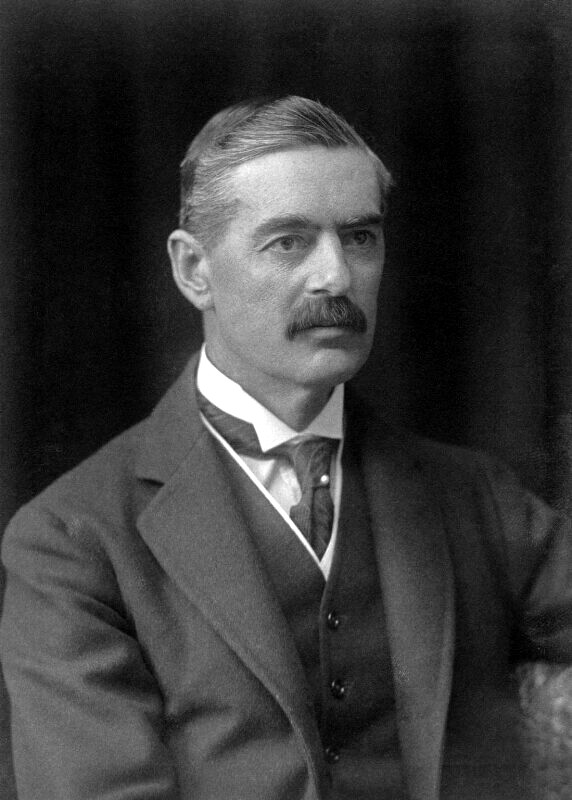Neville Chamberlain | |
|---|---|
 | |
| Born | Arthur Neville Chamberlain 18 March 1869 Birmingham, England |
| Died | 9 November 1940 (aged 71) Heckfield, England |
| Nationality | British |
| Political orientation | Imperialism |
| Political party | Conservative and Unionist Party |
Arthur Neville Chamberlain, was a British politician for the Conservative Party who served as Prime Minister from 28 May 1937 until 10 May 1940. He is best known for his failure to guard the interests of British imperialism against the Nazis in the run up to the Second World War, for his failure he was replaced as Prime Minister by Winston Churchill.[1]
Ealy Life
Chamberlain was born to a political family well established in the ranks of the bourgeoise, being the youngest son of Joseph Chamberlain, a Victorian Cabinet minister, and the half-brother of Austen, a Chancellor of the Exchequer. [1]
He was educated at Rugby and Mason College, Birmingham. When he was 21 Chamberlain left for the Bahamas to manage a 20,000 acre estate before returning to Birmingham when the venture failed and he became a manufacturer.[1]
Political Career
In Birmingham he was elected a councillor in 1911 and Lord Mayor in 1915. Then, in 1916, David Lloyd George appointed him Director General of the Department of National Service, but personal bitterness between them led to his resignation within a year.[1]
In 1918 Chamberlain was elected Conservative MP for Birmingham Ladywood, but refused to serve under Lloyd George in the Conservative-Liberal coalition government. In 1922 he became Postmaster General under Andrew Bonar Law, where he proved his judgement and ability. He was quickly made Minister of Health and, under Stanley Baldwin he soon graduated to Chancellor of the Exchequer.[1]
Following the quick failure of the first Labour government in October 1924 a general election was called in which Chamberlain was challenged for his seat by future leader of the British Union of Fascists, Oswald Mosley who was at the time a Labour candidate. The hard fought campaign offended Chamberlains ego and the vote was very close with two recounts having to be called before a final result of a victory to Chamberlain by 77 votes was declared, with accusations of deceit surfacing. Even after his victory Chamberlain continued to be infuriated by Mosley with the latter making comments such as 'once more we have got the old dud back at the Ministry of Health.' With his seat now more precarious Chamberlain feared losing his place in Parliament and moved to the nearby constituency of Birmingham Edgbaston despite Mosley also not standing in Ladywood in the next election.[2]
In 1931 Ramsay MacDonald made him Chancellor in his national government, and Baldwin retained him in turn.[1]
Premiership
In May 1937 Chamberlain succeeded Baldwin as Prime Minister, and was elected Conservative leader.[1]
With war brewing in Europe Chamberlain was determined to safeguard the interests of imperialism against Nazi Germany, liberals prefer to call Chamberlain a peacemaker but he was simply fulfilling his class interests. He met German chancellor Adolf Hitler in Munich 1938, attempting to negotiate an agreement that averted war whilst still allowing Britain to remain at the top of the world order, his endeavour failed with Germany occupying Prague the following year. Following the invasion of Poland, Chamberlain declared war on 3 September, 1939 but soon came under fire for Britain's abysmal performance at the beginning of the war. Unable to form a national government himself, he resigned in May 1940 and was replaced by Churchill after the failure of the British efforts to occupy Norway before the Nazis could.[1]
Post-Premiership
Bowel cancer struck soon after his resignation, forcing him to leave Winston Churchill’s coalition government, with him dying not long after on 9 November 1940.[1]